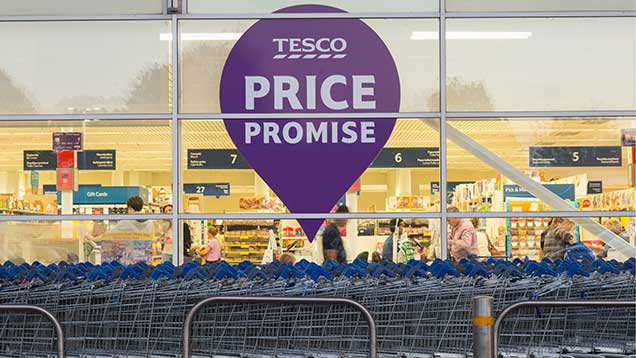Tesco agriculture chief comes under fire
 © Rex
© Rex Tesco’s head of agriculture has been slammed by farmers for not supporting British producers.
Tom Hind, group agriculture director at Tesco, came under fire from all corners of the packed room at Monmouthshire NFU Cymru conference at a meeting on Thursday (22 January).
Dairy farmers criticised the superstore for selling milk at cutthroat prices.
Sheep producers also vented their anger at the supermarket, which claims to be British farmers’ biggest customer, for selling New Zealand lamb when British lamb was still in season.
See also: NFU criticises Tesco’s New Zealand lamb promotion
One angry audience member said: “People have to pay a realistic price for food or it is a race to the bottom. It is really critical for supermarkets to understand that. If it [farming] goes, the whole countryside is in jeopardy.”
But Mr Hind defended Tesco’s actions.
“The recession is affecting the way food business and operations operate. Customers are still feeling hard up and they’ve been prepared to shop around a bit more,” he told the meeting.
As a result he said it was vital Tesco offered its customers value for money.
When asked by Farmers Weekly if he thought selling milk so cheaply in the supermarket was turning it into a “throwaway product”, he replied: “Our customers get a great deal on the product they are buying but we treat our dairy farmers fairly.”
He said about 95% of the company’s fresh milk supply was sourced from Tesco’s dairy group and it was committed to its cost of production model.
But he didn’t want to speculate on whether Tesco’s dairy contract would drop as a result of falling input prices.
“I don’t want to speculate to be honest with you. The model is pretty transparent; we measure based on cost of production, but I don’t have a sense of where that might go.”
Lyndon Edwards, livestock board chairman for Wales, put Tesco’s lamb buying decisions under the spotlight.
He said: “You are [selling] wall-to-wall New Zealand lamb when we still have seven-to-eight-month-old lamb in this country.
“If customers weren’t offered wall-to-wall New Zealand lamb, they would buy British. I would like you to give your customers a choice,” he said.
He said the way Tesco labelled lamb also made it very difficult for consumers to distinguish between British and New Zealand.
But Mr Hind remarked: “We are offering a choice and it is very clearly labelled.”
He said Tesco was making good progress on the pledges made by former CEO Philip Clarke to source more meat from the UK, following the horsemeat scandal.
He said Tesco now had 150 beef farmers and 250 lamb producers signed up to two-year contracts supplying Tesco’s Finest lamb range and standard beef.
“The ambition is to grow our beef and lamb producers. We are looking at how we can develop our plans going forward.”
